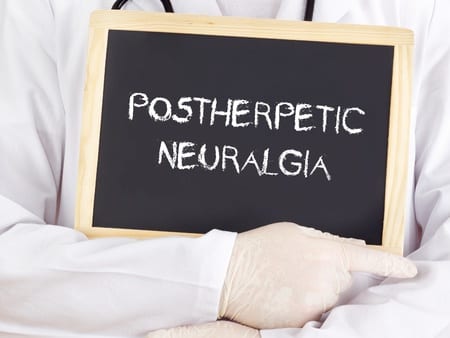
KNOW EVERYTHING ABOUT POSTHERPETIC NEURALGIA IN A NUTSHELL
Postherpetic Neuralgia
Anyone who has had shingles will be relieved when the rash that it creates begins to fade. However, if you’re still in pain after your skin has healed, you may be suffering from postherpetic neuralgia.
This persistent condition affects about 1 in 5 people who have had shingles, and doctors aren’t sure why. The pain may subside after a few months. However, some cases may linger longer. Medications can aid in the management of the condition.
If you’ve had shingles and are still hurting after the other symptoms have gone away, you should see a doctor.
It can feel like an electric jolt to people who have this illness. You can experience tingling, as well as burning or stabbing sensations. Your skin might be extremely sensitive to touch, and the way garments scrape against you makes it difficult to wear them.
Symptoms
The following symptoms are usually localized to the area of skin where the shingles outbreak first occurred:
- Sharp scorching, shooting, or jabbing pain occurs on occasion.
- A searing, throbbing, or painful discomfort that never goes away.
- Touch sensitivity to the extreme
- Temperature sensitivity to the extreme
- Itching
- Numbness
- Headaches
Muscular weakness or paralysis may occur in rare circumstances when the nerve also regulates muscle action.
Some daily activities, such as bathing and dressing, may be hard to perform due to symptoms. Postherpetic neuralgia might also make you tired and make it harder to sleep.
Causes
Postherpetic neuralgia is a type of chronic nerve pain that can develop after shingles. The herpes varicella-zoster virus, which also causes chickenpox, causes shingles. The virus remains inactive in the neurological system after a person recovers from chickenpox.
The herpes varicella-zoster virus can reactivate later in life, resulting in shingles. A Shingle is a skin infection that affects a nerve and the area around it. Typically, the chest and abdomen nerves on one side of the body are damaged. These damages because you heavy nerve pain and this pain can be reduced by Gabapentin 800 mg.
The nerve damage caused by shingles causes the nerve to stop working properly. The malfunctioning nerve becomes confused and sends the brain random, unpredictable pain messages. A throbbing, burning sensation might develop along the nerve as a result of this.
According to experts, shingles cause scar tissue to grow near nerves, putting pressure on them. This causes the nerves to deliver erroneous messages to the brain, including numerous pain sensations. Some patients develop post-herpetic neuralgia for unknown reasons.
Who is afflicted with Postherpetic Neuralgia?
After shingles, not everyone experiences these intense, long-lasting sensations. However, physicians have discovered several factors that can raise your chances of contracting the disease.
It could also be due to age, as in the case of people over the age of 60. Some people aged 50 to 59 who have specific medical diseases that may weaken their immune systems, as well as those who suffer from chronic pain or skin conditions, may benefit from the vaccine. If you fall into this category, speak with your doctor to learn more.
Gender is also one of the reasons linked to this discomfort, with women experiencing it at a higher rate than males.
People who experience numbness, tingling, or itching before developing the shingles rash are more likely to have lasting pain afterward. If you have extreme pain or a rash at the start of your breakout, you’re more likely to get neuralgia later. But if you are suffering from nerve pain after these conditions, contact your doctor and ask about the use of Gabapentin 800mg for treatment.
Other health issues, as well as other underlying issues, can exacerbate the condition. People with chronic illnesses that impair the immune system, such as HIV and cancer, appear to be more susceptible.
If you’re still in discomfort after your shingles outbreak has faded, see your doctor. They may be able to come up with a combination of treatments to assist you with managing your symptoms, and Gabapentin can be used in treatment.
Stimulation of the peripheral nerves
Many forms of neuropathic pain disorders can be relieved with these devices, which are safe, efficient, and effective. They are implanted beneath the skin along the course of peripheral nerves. Doctors conduct a trial run with a tiny wire electrode before implantation to assess the patient’s reaction.
The spinal cord stimulator is placed in the epidural space over the spinal cord through the skin. A peripheral nerve stimulator is a small device that is implanted beneath the skin above a peripheral nerve. The electrodes are turned on as soon as they are in a position to deliver a small electrical current to the nerve.
Experts believe that electrical impulses stimulate the non-painful sensory pathway, tricking the brain into “shutting off” or “turning down” the painful signals, resulting in pain alleviation.
To reduce the sensation of pain, you can use Gabapentin 800.
Final Thoughts
Postherpetic neuralgia can be treated and avoided. The majority of cases go away in 1 to 2 months. It may persist longer than a year in some circumstances. It’s a good idea to take Gabapentin for shingles and postherpetic neuralgia. If you do get postherpetic neuralgia, you have a variety of pain-relieving choices.










